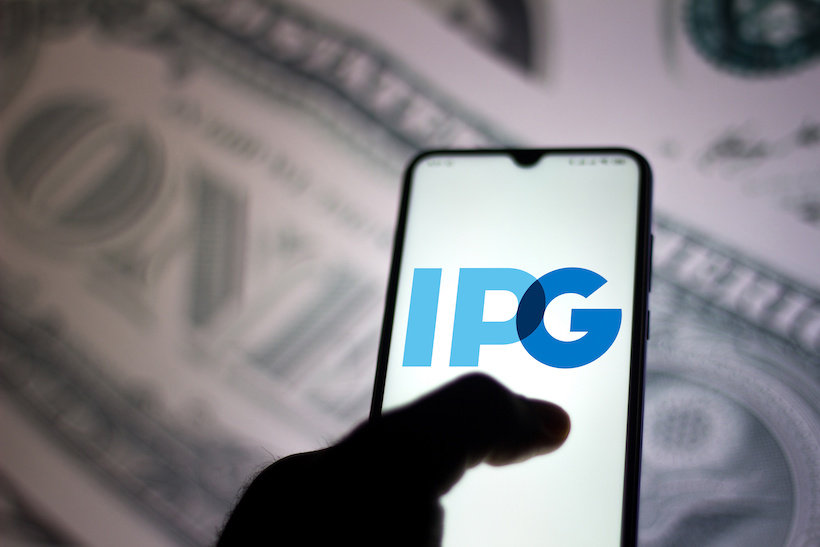IPG posted another quarter of solid organic growth, climbing 15.7% year over year to $2.27 billion, after the pandemic led to a 3.7% decline in Q3 2020, the company said on Thursday.
Results were also strong over 2019, increasing 10.7% year over year from 2019 levels in a sign that the agency sector is bouncing back from the depths of the pandemic.
In the U.S., organic growth was 14.7%. International markets, which account for 35% of IPG’s net revenue, grew 15.4% organically, with the U.K. up 13.3%, continental Europe up 11.18% and Asia-Pacific up 17.4% year over year.
By sector, IPG’s integrated agency network grew 14.4% organically, led by its media, data and technology agencies, as well as R/GA, Huge, MullenLowe, McCann and FCB. Advertising agencies were bolstered by their healthcare divisions, which have been a growth area for agencies during the pandemic.
IPG Dxtra, the group’s PR, sports and entertainment segment, grew 18.6% year over year organically as in-person entertainment started to rebound globally.
Clients in hard-hit sectors are also spending again, with auto, government and industrials, tech, telecom, retail and healthcare increasing spending by double-digit percentage points in the quarter.
IPG revised its 2021 growth forecast upwards to 11% from the 9% to 10% range previously projected, with an EBITA margin of 16.8%, up 80 basis points from its previous projection.
“Our growth reflects the cyclical economic recovery as well as the important structural currents that favor the kinds of higher-order expertise with which we are well-resourced,” said Philippe Krakowsky, CEO of IPG, on the earnings call.
Talent
IPG continues to enjoy increased savings on payroll, office and travel expenses as employees largely continue to work from home.
But these costs are starting to rise as people return to the office and travel. IPG’s ratio of salaries and related expenses as a percentage of net revenues was 66.8%, up from 65% last quarter, and temporary labor costs were 5% of revenues as the company struggles to hire talent to keep pace with revenue growth.
Last year, agencies shed thousands of jobs during the pandemic that they are trying to refill as business picks back up, but a global talent shortage is making attracting and retaining talent difficult. IPG’s worldwide headcount increased 8% in the last year to approximately 54,600, an addition of 4,500 people.
“The talent market is competitive and attrition is higher post-pandemic,” said CFO Ellen Johnson on the call. “We’re seeing a two-year attrition rate this year, and because we’re growing so fast. Our hiring has not kept up.”
Amid the talent crunch, IPG is changing its recruitment techniques by adding referral bonuses, creating promotion opportunities for employees and looking to bring back groups such as working moms who have dropped out of the workforce during the pandemic.
IPG also talked about its investments in ESG on the call, including building on its DE&I initiatives, committing to reaching net zero carbon emissions by 2040 and sourcing renewable energy for its entire portfolio by 2030. IPG has also created its first human rights policy to address social issues around LGBTQ+ rights, mental health awareness, racial bias and sustainability.
“It’s not all about compensation,” Johnson said. “It’s about the quality of the work environment, training and development and company values.”
Health, data, e-com and metaverse
IPG called out healthcare, which makes up approximately a quarter of company revenues, as a strong growth area throughout and beyond the pandemic, along with data capabilities underpinned by Acxiom. Krakowsky pointed to Mediahub’s win of the Morgan Staney and E-Trade account with data strategy led by Acxiom as a key component of the brief.
Krakowsky also said he is pleased with how the integration has gone in the three years since IPG acquired Acxiom, with the group showing up in healthcare briefs, multi-agency relationships and across all of IPG’s top 20 clients. But he noted that progress has been slightly hindered by remote working.
“Innovation internally is harder to do when people aren’t together,” he said.
Krakowsky also pointed to commerce, noting the launch of Reprise Commerce late last year, as a key focus, as well as R/GA’s “direct to avatar” capability that will help brands operate in the metaverse.
“The industry is clearly undergoing transformation,” he said. “There’s an evolution taking place here. If you’re running a business today ... you’re looking for partners that can help you address a range of things that are digital economy-related.”











